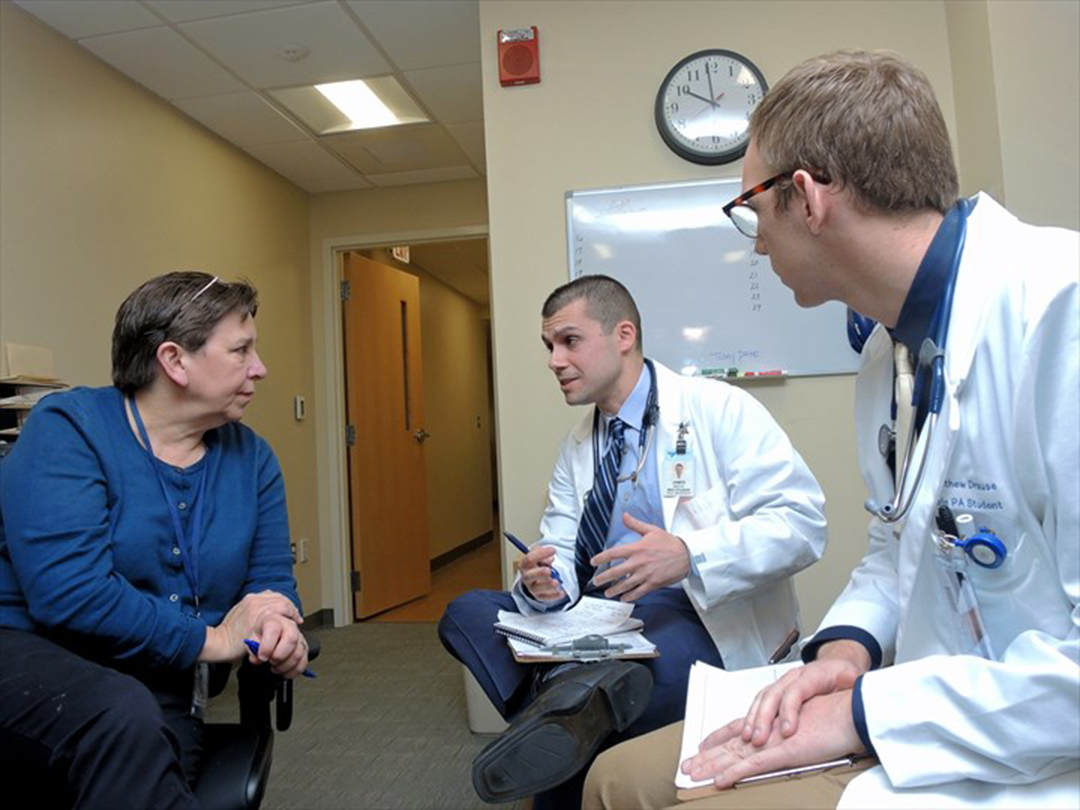
Courtesy of John Curtis
HAVEN Free Clinic, a Yale student-run clinic that provides medical care to the city’s underserved communities, has completed its move to the Yale Physicians Building, ending a nearly two-year transition period.
HAVEN had operated out of the Fair Haven Community Health Center’s Grand Avenue offices since the clinic was founded in 2005. But in 2015, restrictions imposed by the U.S. Health Resources and Services Administration compelled the clinic to search for a new home. With the help of Yale Medicine, the Yale School of Medicine’s clinical practice, HAVEN managed to secure a new space in the Yale Physicians Building, which is located approximately three miles away in the Hill neighborhood on Howard Avenue.
The clinic officially opened its new offices on March 4. According to HAVEN executive directors Hannah Alter MED ’18, Linda Chow SPH ’18 and Kaitlin Erickson NUR ’19, the transition proceeded without major complications. Although the clinic’s patient base is centered in the Fair Haven neighborhood, Alter said that the clinic has not experienced a significant drop in patients, noting that most of the appointments scheduled for the month were made prior to the move.
“We’ve been able to successfully map the clinic flow onto the new space and everyone has been really excited about how well the clinic flow is working,” Alter said. “We’ve heard from both patients and volunteers that they enjoy working in the new space and having the location downtown.”
As with the Fair Haven offices, the clinic’s new space is divided into departments, with most departments possessing their own facilities to see patients, Erickson said. She added that the move makes the clinic feel more connected to the Yale community, because it is closer to the medical campus.
One noticeable change to the clinic’s structure is that the exam rooms are much larger than before, according to Alter. Because there are many people involved in each appointment, including clinical students, student interpreters and attending physicians, the new exam rooms are able to facilitate more clinical staff, she said.
Prior to the move, the clinic took a number of measures to inform their patients about the relocation, as well as to provide additional support to those who may be inconvenienced by the change, according to Gabriel Betancur ’19, the clinic’s director of interpreting and diversity. He said that after the move was announced last October, volunteers notified their patients about the new address during their weekly appointments, adding that some patients even reported that the new location was more convenient.
Medical school professor Bradley Richards, one of HAVEN’s medical directors, noted that there were many logistical difficulties associated with the move, but he praised the clinic’s leadership for taking steps to ensure a smooth transition.
“I think overall, [the transition] went extremely — even surprisingly — smoothly, given that we’re dealing with an underserved population that has limited resources and often doesn’t speak the same language as many of the providers,” Richards said. “I definitely had a lot of concerns going into it just because it’s a big change for a large volunteer organization. A lot of the credit should go to the executive team in really publicizing the change and making buses and street parking available for the patients.”
In addition, Betancur said the clinic also secured grants to fund bus vouchers for the patients who expressed a need for transportation. The buses currently run from the Fair Haven neighborhood to the downtown area.
According to Alter, the clinic also plans to pilot new patient transportation programs with a grant from Gilead Foundation, an international nonprofit that aims to improve the welfare of underserved communities and that has generously supported HAVEN each year.
Richards said that he hopes the relocation will provide a unique opportunity for more people to get involved with the clinic, adding that he believes HAVEN could benefit from incorporating more Yale New Haven Hospital residents into its model. The clinic will also focus on an ongoing project that involves connecting undocumented immigrants with legal counsel and other resources, he said.
Chow said that the clinic’s priorities involve recruiting more volunteers and expanding HAVEN’s capacities to serve the local community. In the months after the move, the clinic will continue collecting data to see how the patient population changes, she said.
“As our patient census grows, our ability to engage more volunteers around campus also grows,” Alter said. “It’s really exciting that HAVEN can expand both of its missions: patient care and student education.”
The HAVEN clinic serves about 40 patients per week with a staff of 400 volunteers each year, including undergraduates and graduate and professional students.







